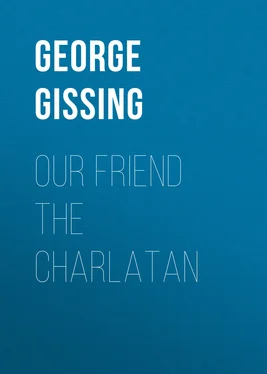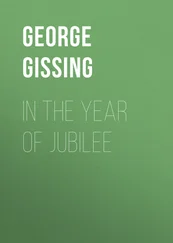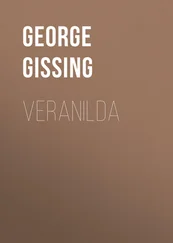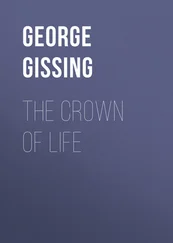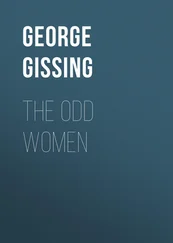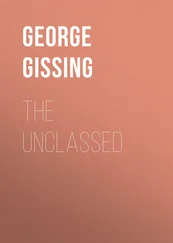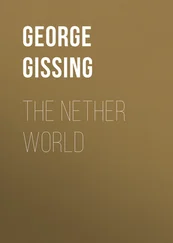George Gissing - Our Friend the Charlatan
Здесь есть возможность читать онлайн «George Gissing - Our Friend the Charlatan» — ознакомительный отрывок электронной книги совершенно бесплатно, а после прочтения отрывка купить полную версию. В некоторых случаях можно слушать аудио, скачать через торрент в формате fb2 и присутствует краткое содержание. Жанр: foreign_prose, literature_19, foreign_antique, на английском языке. Описание произведения, (предисловие) а так же отзывы посетителей доступны на портале библиотеки ЛибКат.
- Название:Our Friend the Charlatan
- Автор:
- Жанр:
- Год:неизвестен
- ISBN:нет данных
- Рейтинг книги:4 / 5. Голосов: 1
-
Избранное:Добавить в избранное
- Отзывы:
-
Ваша оценка:
- 80
- 1
- 2
- 3
- 4
- 5
Our Friend the Charlatan: краткое содержание, описание и аннотация
Предлагаем к чтению аннотацию, описание, краткое содержание или предисловие (зависит от того, что написал сам автор книги «Our Friend the Charlatan»). Если вы не нашли необходимую информацию о книге — напишите в комментариях, мы постараемся отыскать её.
Our Friend the Charlatan — читать онлайн ознакомительный отрывок
Ниже представлен текст книги, разбитый по страницам. Система сохранения места последней прочитанной страницы, позволяет с удобством читать онлайн бесплатно книгу «Our Friend the Charlatan», без необходимости каждый раз заново искать на чём Вы остановились. Поставьте закладку, и сможете в любой момент перейти на страницу, на которой закончили чтение.
Интервал:
Закладка:
"Oh, Mr. Lashmar! Oh, don't!" exclaimed Iris, in a pained voice. "How can you be so unkind—so unjust!"
"No, no; I merely want to guard myself against misconception. The very freedom with which I speak to you might lead you to misjudge me. If I thought you were ever tempted to regard me as an adventurer—"
"Mr. Lashmar!" cried Iris, almost tearfully. "This is dreadful. How could such a thought enter my mind? Is that your opinion of me?"
"Pray don't be absurd," interposed Dyce, with an impatient gesture. "I detest this shrillness, as I've told you fifty times."
Iris bridled a little.
"I'm sure I wasn't shrill . I spoke in a very ordinary voice. And I don't know why you should attribute such thoughts to me."
Lashmar gave way to nervous irritation.
"What a feminine way of talking! Is it impossible for you to follow a logical train of ideas? I attributed no thought whatever to you. All I said was, that I must take care not to be misunderstood. And I see that I had very good reason; you have a fatal facility in misconceiving even the simplest things."
Mrs. Woolstan bridled still more. There was a point of colour on her freckled cheeks, her lower lip showed a tooth's pressure.
"After all," she said, "you must remember that I am a woman, and if women don't express themselves quite as men do, I see no great harm in it. I don't think mannishness is a very nice quality. After all, I am myself, and I can't become somebody else, and certainly shouldn't care to, if I could."
Dyce began to laugh forbearingly.
"Come, come," he said, "what's all this wrangling about? Row did it begin? That's the extraordinary thing with women; one gets so easily off the track, and runs one doesn't know where. What was I saying? Oh, simply that I couldn't be sure, yet, whether Hollingford would suit me. Let us keep to the higher plane. It's safer than too familiar detail."
Iris was not to be so easily composed. She remarked a change in her friend since he had ceased to be Leonard's tutor; he seemed to hold her in slighter esteem, a result, no doubt, of the larger prospects opening before him. She was jealous of old Lady Ogram, whose place and wealth gave her such power to shape a man's fortunes. For some time now, Iris had imagined herself an influence in Lashmar's life, had dreamed that her influence might prevail over all other. In marrying, she had sacrificed herself to an illusory hope; but she was now an experienced woman, able to distinguish the phantasmal from the genuine, and of Lashmar's powers there could be no doubt. Her own judgment she saw confirmed by that of Lady Ogram. Sharp would be her pang if the aspiring genius left her aside, passed beyond her with a careless nod. She half accused him of ingratitude.
"I'm not at all sure," she said, rather coldly, "that you think me capable of rising to the higher plane. Perhaps trivial details are more suited to my intelligence."
Dyce had relieved himself of a slight splenetic oppression, and felt that he was behaving boorishly. He brightened and grew cordial, admitted a superfluous sensitiveness, assured his companion that he prized her sympathy, counted seriously upon her advice; in short, was as amiable as he knew how to be. Under his soothing talk, Mrs. Woolstan recovered herself; but she had a preoccupied air.
"If you regard me as a serious friend," she said at length with some embarrassment, "you can easily prove it, and put my mind at ease."
"How?" asked Dyce, with a quick, startled look.
"You have said more than once that a man and woman who were really friends should be just as men are with each other—plain-spoken and straightforward and—and no nonsense."
"That's my principle. I won't have any woman for a friend on other terms."
"Then—here's what I want to say. I'm your friend call me Jack or Harry, if you like—and I see a way in which I can be of use to you. It happens that I have rather more money than I want for my own use. I want to lend you some—until your difficulties are over—just as one man would to another—"
Her speech had become so palpitant that she was stopped by want of breath; a rosy shamefacedness subdued her; trying to brave it out, she achieved only an unconscious archness of eye and lip which made her for the moment oddly, unfamiliarly attractive. Dyce could not take his eyes from her; he experienced a singular emotion.
"That's uncommonly good of you, Iris," he said, with all the directness at his command. "You see, I call you by your name, just to show that I take our friendship seriously. If I could borrow from anyone I would from you. But I don't like the idea. You're a good fellow—" he laughed—"and I thank you heartily."
Iris winced at the "good fellow."
"Why can't you consent to borrow?" she asked, in a note of persistence. "Would you refuse if Lady Ogram made such a suggestion?"
"Oh, Lady Ogram! That would depend entirely—"
"But you must have money from somewhere," Iris urged, her manner becoming practical. "I'm not rich enough to lend very much, but I could help you over a year, perhaps. Wouldn't you rather go back to Rivenoak with a feeling of complete independence?—I see what it is. You don't really mean what you say; you're ashamed to be indebted to a woman. Yes, I can see it in your face."
"Look at the thing impartially," said Dyce, fidgetting in his chair. "How can I be sure that I should ever be able to pay you back? In money matters there is just that difference a man can go to work and earn; a woman generally can't do anything of the kind. That's why it seems unjust to take a woman's money; that's the root of all our delicacy in the matter. Don't trouble about my affairs; I shall pull through the difficult time."
"Yes," exclaimed Iris, "with somebody else's help. And why should it be somebody else? I'm not in such a position that I should be ruined if I lost a few hundred pounds. I have money I can do what I like with. If I want to have the pleasure of helping you, why should you refuse me? You know very well—at least, I hope you do—that I should never have hinted at such a thing if we had been just ordinary acquaintances. We're trying to be more sensible than everyday people. And just when there comes a good chance of putting our views into practice, you draw back, you make conventional excuses. I don't like that! It makes me feel doubtful about your sincerity—Be angry, if you like. I feel inclined to be angry too, and I've the better right!"
Again her panting impulsiveness ended in extinction of voice, again she was rosily self-conscious, though, this time, not exactly shamefaced; and again the young man felt a sort of surprise as he gazed at her.
"In any case," he said, standing up and taking a step or two, "an offer of this kind couldn't be accepted straightaway. All I can say now is that I'm very grateful to you. No one ever gave me such a proof of friendship, that's the simple fact. It's uncommonly good of you, Iris—"
"It's not uncommonly good of you ," she broke in, still seated, and her arms crossed. "Do as you like. You said disagreeable things, and I felt hurt, and when I ask you to make amends in a reasonable way—"
"Look here," cried Lashmar, standing before her with his hands in his pockets, "you know perfectly well— perfectly well —that, if I accept this offer, you'll think the worse of me."
Iris started up.
"It isn't true! I shall think the worse of you if you go down to Lady Ogram's house, and act and speak as if you were independent. What sort of face will you have when it comes at last to telling her the truth?"
Dyce seemed to find this a powerful argument. He raised his brows, moved uneasily, and kept silence.
"I shall not think one bit the worse of you," Iris pursued, impetuously. "You make me out, after all, to be a silly, ordinary woman, and it's horribly unjust. If you go away like this, please never come here again. I mean what I say. Never come to see me again!"
Читать дальшеИнтервал:
Закладка:
Похожие книги на «Our Friend the Charlatan»
Представляем Вашему вниманию похожие книги на «Our Friend the Charlatan» списком для выбора. Мы отобрали схожую по названию и смыслу литературу в надежде предоставить читателям больше вариантов отыскать новые, интересные, ещё непрочитанные произведения.
Обсуждение, отзывы о книге «Our Friend the Charlatan» и просто собственные мнения читателей. Оставьте ваши комментарии, напишите, что Вы думаете о произведении, его смысле или главных героях. Укажите что конкретно понравилось, а что нет, и почему Вы так считаете.
